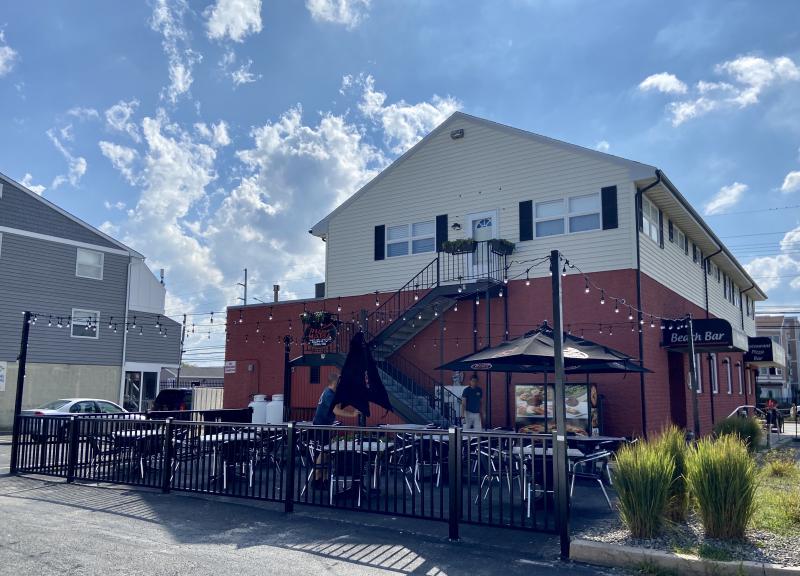Dewey dishes on outdoor dining
After impactful public comment, Dewey commissioners voted unanimously Aug. 19 to refer conditional-use applications sought by restaurateurs to maintain their outdoor dining spaces to the planning and zoning commission.
In May 2020, commissioners voted to temporarily allow restaurants operating under reduced occupancy levels due to the COVID-19 pandemic to expand outdoor seating areas. With the expansion set to expire in March, commissioners voted to impose a moratorium on the expiration until Oct. 31.
Town Manager Bill Zolper then notified businesses that had received the temporary expansion that they must apply for a conditional-use permit and seek commissioner approval before Oct. 31 if they want to maintain the expansions.
At the Aug. 19 public hearing and meeting regarding the applications, Mayor Bill Stevens said whatever commissioners decide, it will be a permanent conditional use for that space.
“These changes could be significant in terms of the town perspective,” Stevens said, noting the moratorium could be extended past Oct. 31 until matters are settled.
Former commissioner and head of Highway One Companies Alex Pires, who owns Jimmy’s Grille, one of the properties under consideration, spoke first during public comment.
“This is one of the most serious matters we've had in front of the town in decades,” Pires said. “These are permanent additions to property that involve not only food but most of them alcohol, which is both town-regulated, state-regulated and federal-regulated. It’s a really serious matter.”
Some properties are grandfathered, others are not, Pires said. Some have a fire marshal-certified statement on capacity, and can't have different capacity numbers than what the fire marshal approves.
“There can’t be a separate number. That makes no sense. What are we going to do, self-police?” Pires asked. “If that’s the case, if we’re going to do it that way, the entire Rudder parking lot is going to be a patio. These all have to go to planning and zoning.”
Pires said his application is one of the most simple, since he owns the property, and he has a non-grandfathered conditional use. Some applicants don’t own the property, he said.
“Any applicant who has signed it and is not the owner doesn't have the right to bind the owner. That's not the law,” Pires said. “The law is, you need the landlord, because the landlord has the rights; not the lessee, not the tenant.”
Even though his application is one of the most simple, Pires said, it should be sent to planning and zoning. Lenders are involved, and the fire marshal needs to determine the patron space inside and outside. The property owner needs to be determined, as does whether the property is grandfathered, he said.
“Every time we go fast, we regret it,” Pires said.
Once a right is given, it can’t be taken back, Pires said. He suggested restaurants operate as is, and that planning and zoning hold two to three hearings at a time and give recommendations to commissioners.
“To do it now and do it piecemeal is wrong,” Pires said. “There’s going to be a lawsuit, and the first thing the lawsuit is going to say, right from the start, is that everybody was not treated the same.”
The Starboard owner Steve “Monty” Montgomery next stated that everyone is in favor of outdoor dining, and that the application for Starboard Raw should not go to planning and zoning.
“I don't argue that there's some fine-tuning that will need to be done by the town to ensure the future and things like that, but for Starboard Raw; we are an insignificant change,” Montgomery said. “We’ve changed absolutely nothing but put four tables on an existing deck that we lease.”
Commissioner Gary Persinger said he could not remember an instance in which commissioners determined a conditional-use request was not significant; Town Counsel Fred Townsend said he could think of perhaps one occasion.
“One rule doesn't work for all,” Townsend said, noting each property is unique, which justifies the conditional-use process for restaurants.
Commissioner David Jasinski said the public wants everyone treated equitably. All applications have varying degrees of significance, he said, and while Starboard Raw’s proposed changes are not significant, the town has previously referred an application to planning and zoning over just a few tables.
“We want the public to trust that everyone has to adhere to the same process,” Jasinski said. “Planning and zoning needs to hear all of these, listen to what the public has to say, develop conditions and recommendations, and send those recommendations back to us.”
Stevens said he didn't know how commissioners could not send all applications to planning and zoning. The Oct. 31 moratorium still exists, he said, but if the process takes longer, the moratorium will be extended.
Starboard Raw, Lighthouse Cove Restaurant and Event Center, Woody’s Dewey Beach, Dewey Beach Country Club, Jimmy’s Grille, Dewey Beer Company, Mama Maria and The Dewey Post applied for a conditional-use permit and restaurant permit of compliance.
Because hearings are time-intensive, Assistant Town Manager Jim Dedes said, the requests will be broken into two meetings, with applicants being heard in the order in which they applied.
Applications for Mama Maria, Jimmy’s Grille, Starboard Raw, and Lighthouse Cove will be heard at the Saturday, Sept. 10 planning and zoning commission meeting. A hearing for the remaining applicants has not yet been scheduled.
The Starboard has opted for its plans to be heard by the board of adjustment, Zolper said. The board has scheduled a hearing for 6 p.m., Thursday, Sept. 15.
Town commissioners will hold their regular monthly meeting at 3 p.m., Friday, Sept. 16; an agenda has not yet been set.




















































